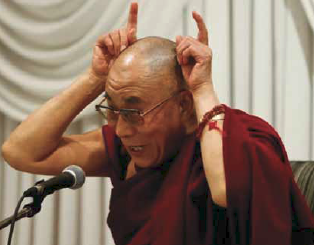Since when was wealth common?
What could possibly link Angelina Jolie and the first female President of Sri Lanka, Chandrika Bandaranaike Kumaratunga? Why William Hague and last week’s Commonwealth summit, of course!
What could possibly link Angelina Jolie and the first female President of Sri Lanka, Chandrika Bandaranaike Kumaratunga? Why William Hague and last week’s Commonwealth summit, of course! There has been a bizarre image occasionally popping up over the past few months, of a rather smitten MP standing beside Angelina Jolie talking about the horrors of rape and abuse that women suffer the world over. The most striking image I have of Kumaratunga is, perhaps, less comical: she had made a speech in Colombo brutally criticising the mass murder and war crimes committed by the Sri Lankan government in the closing stages of the ‘war’ against the Tamil ‘Tigers’. I never expected to hear a former head of state claim to be ashamed at being from the country they served but these were the words that came from Kumaratunga’s mouth. Yet somehow, poor old Willy has forgotten Angie’s campaign and is going to the Commonwealth summit held in Sri Lanka. Forget the ‘allegations’ of war crimes, of mass rape, of the murder of women, children and civilians, by the Sri Lankan government since well before their culmination in the atrocities of 2011. Forget the videos of mass execution and war crimes in the Channel 4 Documentary: Sri Lanka’s Killing Fields – one of those rare examples of journalistic integrity that renews your faith in the free press. The video may have been verified by the UN, but forget that, the Sinhalese government claims that it is a forgery. That clearly settles the matter. Yes, once again, the British government has distinguished itself in its concern for alleged human rights abuses. But a boycott, no. That would be unthinkable and damaging. It is only through discussion, talk, and trade (especially trade), that we can encourage governments to act in a humane way. If I recall correctly, similar arguments were made by another respected Tory leader, and her American counterpart, apropos some other backwards regime… What was it again? Apartheid South Africa? I think there must be something wrong there but I can’t quite figure out what. Well regardless, we must let history be the judge. Getting back to the point; should we really, however, see the spate of boycotts as a positive sign? Although I would suggest it is idiotic to complain that, as one online headline put it, the Indian boycott was made for Political Reasons (what reasons, pray, were you expecting?), and though Canada’s motivations are probably relatively benign (the large Tamil ex-pat population will also have played a factor), we should really never be satisfied with the stories politicians like to tell about themselves. PM Manmohan Singh may well care deeply for ‘Commonwealth values’, but the continued and sinister movements made by the Indian government against the Naxalite rebels has some disturbing parallels with the Sinhalese campaign against the Tamil Tigers before 2011. More likely, Singh felt the pressure of the large Tamil population (and elements of government) in India. If this was all, India’s intentions would still be largely honourable – we often seem to forget that listening to the will of the people is essentially democratic and there is little wrong in principle if a politician serves that people instead of his or her own ideas and beliefs. This is, however, not all. Is it coincidence that the Mauritian PM joined the boycott? Mauritius (along with Madagascar and the Seychelles) has recently seen a lot of Indian interest. India needs to protect its trade ships against the resurgent phenomenon of piracy, and these islands make ideal bases to do so. Well, there is that and the fact that India has steadily been losing out as far as imperial and geopolitical dominance in the Indian Ocean is concerned. China’s String of Pearls strategy has been remarkably effective, isolating India and restricting its sphere of influence. And the Koh-i-Noor in that string of pearls? You guessed it: Sri Lanka. For instance, what does a largely Buddhist and Islamic country like Sri Lanka need with a $400 million casino? Nothing, but the growing Chinese and Indian middle classes could do with entertainment when they visit the tropical paradise. It is just a pity that it is in the middle of a civil war… Oh wait! With a Reuters report estimating a further $2.5 billion a year from tourism alone (a modest 5% of GDP, something equivalent to $750 billion dollars in the US, or put differently, the entire US bailout fund), Sri Lanka needs to prepare itself to cater for all those nouveau riche. Or take the fancy new Lotus tower: it will be 350m upon completion, dwarfing the Shard, and funded out of the goodwill of the People’s Republic of China. The Sri Lankan’s benefit, the Indian tourists benefit and the Chinese benefit. Everybody is happy! Except the Tamils. With the mass murders of 2011, further claims for independence are unlikely to be top priority for the people of Northern Sri Lanka. Especially considering the immediate future holds nothing but grim prospects. Manmohan Singh himself inaugurated the dredging of the ancient Ram Sethu Canal, trying to make the Tamil Nadu area of India a “rival for [the now destitute] Detroit”. The toxic effects on the ecosystem are probably of secondary concern to Singh, particularly since the one of the worst groups to be affected will be Tamils living in coastal areas of Sri Lanka, where small scale fishing is an intrinsic part of everyday survival. Meanwhile the great ‘benefits’ of Chinese investment have come at a bitter price to the Tamil people (assuming that the effective North/South divide doesn’t prevent the even spread of new wealth as it always has done in the past). Is it coincidence that the $4 billion worth of infrastructure projects and the new deep trade-links came after China sold Sri Lanka the weapons needed for the victory over the um, terrorist, children? The only surprise in all this is that India bothered to boycott at all. It seems clear that they care very little about the Sri Lankan Tamils, and a short term spat with the teardrop isle may well lead to an entrenched Chinese position which India cannot desire in its small neighbour. The pressure from Tamil politicians may be considerable, though we doubt it can be important for a government so notoriously corrupt and which has such blatant imperialist ambitions. The general consensus is that India is only damaging its international position by boycotting this meeting, so what could be the motivation? It could be that the internal situation in India is even more desperate than commentators seem to think. Or could these whispers of a new Chinese-Indian trade deal I am hearing have anything to do with it? Common wealth? Somehow, I think not.








